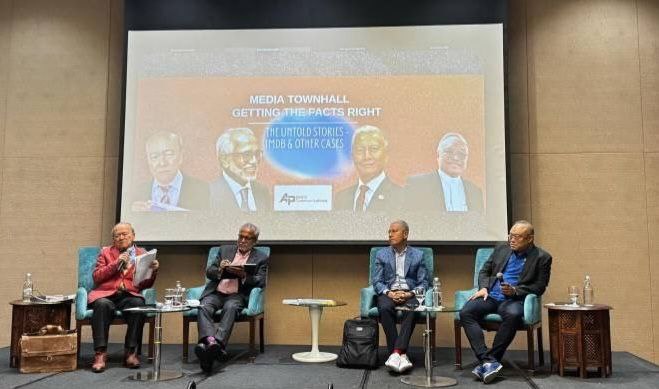Tan Sri Azhar Harun’s speech at the Media Townhall titled “Getting the Facts Right: The Untold Stories of 1MDB and Other Cases” shed light on the powers of the Yang di-Pertuan Agong under the Federal Constitution, while offering clarification on the ongoing controversy surrounding the judicial review and petition for the pardon of Datuk Seri Najib Razak.
KUALA LUMPUR – The heated debate surrounding the prerogative powers of the Yang di-Pertuan Agong and the judicial review of former Prime Minister Datuk Seri Najib Razak’s house arrest petition took center stage during Tan Sri Azhar Harun’s speech at the Media Townhall titled “Getting the Facts Right: The Untold Stories of 1MDB and Other Cases.” The event, which was organized by AP Media Comms, aimed to clarify misunderstandings about high-profile cases within Malaysia’s legal and political system.
During his speech, Azhar, a former Speaker of the Dewan Rakyat and renowned constitutional law expert, offered vital insights into the Agong’s powers under Article 42 of the Federal Constitution, specifically regarding Najib’s house arrest petition.
Azhar Harun on the Agong’s Powers
Azhar explained that Article 42 grants the Agong broad powers, not only to issue pardons but also to reduce sentences, grant delays, and offer temporary relief.
“This power is not limited to pardons alone,” Azhar said. “The Agong can suspend sentences, reduce prison terms, or replace prison sentences with house arrest.”
He also delved into the historical context of this power, which originates from the traditional role of monarchs as the highest source of justice and mercy. “Although legislative and judicial powers have been transferred to Parliament and the courts, the Agong’s prerogative to grant pardons remains a personal power,” Azhar explained.
Azhar further emphasized that this prerogative has been reaffirmed by the courts in several landmark cases. “The courts have repeatedly confirmed that the Agong is not bound by the recommendations of the Pardons Board. This is a fundamental principle of our constitutional system,” he added.
Controversy Surrounding the Addendum: Evidence or Hearsay?
The controversy regarding Najib’s petition began when an affidavit filed by Deputy Prime Minister Datuk Seri Zahid Hamidi and Pahang Menteri Besar Datuk Seri Wan Rosdy Wan Ismail alleged that the Minister of Investment, Trade, and Industry, Datuk Seri Tengku Zafrul Abdul Aziz, had shown a document on his phone suggesting house arrest for Najib.
Azhar disagreed with the court’s decision to reject this affidavit as hearsay. “This evidence goes beyond hearsay because both witnesses claimed to have seen the addendum directly. The credibility of this evidence should be debated on its merits, not dismissed outright,” he argued.
Call for Transparency
Azhar also highlighted the importance of transparency in handling Najib’s petition for a pardon. He criticized the government’s response to parliamentary questions regarding the existence of the addendum, calling it vague and insufficient. “Najib, as the petitioner, has the right to know the outcome of his petition. Denying him this information undermines the principles of justice and the rule of law,” he stated.
He further noted that any decision by the Agong requires official documentation, which must pass through agencies such as the Prisons Department, the Ministry of Home Affairs, and the Attorney General’s office. “If this addendum exists, someone in these agencies must know about it. The lack of clarity only fosters unnecessary speculation,” Azhar added.
Conclusion
Azhar Harun’s analysis at the Media Townhall underscored the complexities of constitutional law and the need for transparency in high-profile cases. As public interest in Najib’s house arrest petition continues to grow, events like “Getting the Facts Right” serve as an important platform for enhancing understanding and ensuring accountability within Malaysia’s justice system.
In conclusion, Azhar said, Najib, as a citizen, has petitioned his King and should be informed about the outcome of his petition.
“He has the right to know the full result of his petition!” Azhar emphasized.
“Can you imagine, you sue me, but the judge does not want to tell me the result? So how? What is going to happen to our rule of law when the people are not told the result of the legal action?
“I’m not accusing the government of anything, but in the normal course of business, if there is a pardon, that document will go to the Prisons Department because they have to act on it.
“With all the procedures—Prisons Department, the Ministry of Home Affairs, the Legal Affairs Division, the Law Minister, and the Attorney-General—someone must know. At the very least, the Prisons Department will know.
“A question was asked in Parliament, but the answers are not satisfactory. I think it’s only fair that the petitioner be made aware of the full result of his petition.
“Because that’s a petition to his King. And only the Agong can exercise the power of mercy,” he said.
Media Townhall: Correcting Misunderstandings

This Media Townhall also served as a platform for experts and stakeholders to discuss narratives surrounding cases like 1MDB and Najib’s petition. The event, organized by AP Media Comms, promoted informed dialogue, challenged misinformation, and enhanced understanding of Malaysia’s legal and political landscape.
“Our objective is to ensure that the public gets an accurate and balanced perspective on these complex cases. Events like this are crucial to counter misunderstandings and provide clarity so that the media can report correctly, and the public can receive true explanations,” said a spokesperson for AP Media Comms.
In addition to Azhar, the main panelists included Najib’s lead lawyer, Tan Sri Shafee Abdullah, and prominent Syariah lawyer Tuan Adzly Abdul Manas. Senior lawyer and social activist Tuan Haji Kamarudin Ahmad was invited as the moderator and also provided insights into other related cases, such as the IPIC case and the contents of former Attorney General Tan Sri Tommy Thomas’s book. – NMH
… other news to follow …
Datin Hasnah is the co-founder and CEO of New Malaysia Herald based in Kuala Lumpur, Malaysia.
With an extensive background in mass communication and journalism, she works on building up New Malaysia Herald and it’s partner sites. A tireless and passionate evangalist, she champions autism studies and support groups.
Datin Hasnah is also the Editor in Chief of New Malaysia Herald.

Facebook Comments